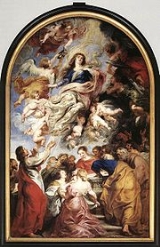
Assumption of Mary
Overview
Roman Catholic Church
The Catholic Church, also known as the Roman Catholic Church, is the world's largest Christian church, with over a billion members. Led by the Pope, it defines its mission as spreading the gospel of Jesus Christ, administering the sacraments and exercising charity...
, Eastern Orthodoxy, Oriental Orthodoxy
Oriental Orthodoxy
Oriental Orthodoxy is the faith of those Eastern Christian Churches that recognize only three ecumenical councils — the First Council of Nicaea, the First Council of Constantinople and the First Council of Ephesus. They rejected the dogmatic definitions of the Council of Chalcedon...
, and parts of the Anglican Communion
Anglican Communion
The Anglican Communion is an international association of national and regional Anglican churches in full communion with the Church of England and specifically with its principal primate, the Archbishop of Canterbury...
and Continuing Anglicanism, the Assumption of Mary was the bodily taking up of the Virgin Mary
Mary (mother of Jesus)
Mary , commonly referred to as "Saint Mary", "Mother Mary", the "Virgin Mary", the "Blessed Virgin Mary", or "Mary, Mother of God", was a Jewish woman of Nazareth in Galilee...
into Heaven
Heaven
Heaven, the Heavens or Seven Heavens, is a common religious cosmological or metaphysical term for the physical or transcendent place from which heavenly beings originate, are enthroned or inhabit...
at the end of her life. The Roman Catholic Church teaches as dogma
Dogma (Roman Catholic)
In the Roman Catholic Church, a dogma is an article of faith revealed by God, which the magisterium of the Church presents to be believed. The resurrection of Jesus Christ is the basic truth from which salvation and life is derived for Christians. Dogmata regulate the language, how the truth of...
that the Virgin Mary "having completed the course of her earthly life, was assumed body and soul into heavenly glory." This doctrine was dogmatically and infallibly defined
Dogmatic definition
In Catholicism, a dogmatic definition is an extraordinary infallible statement published by a pope or an ecumenical council concerning a matter of faith or morals, the belief in which the Catholic Church requires of all Christians .The term most often refers to the infallible...
by Pope Pius XII
Pope Pius XII
The Venerable Pope Pius XII , born Eugenio Maria Giuseppe Giovanni Pacelli , reigned as Pope, head of the Catholic Church and sovereign of Vatican City State, from 2 March 1939 until his death in 1958....
on November 1, 1950, in his Apostolic Constitution
Apostolic constitution
An apostolic constitution is the highest level of decree issued by the Pope. The use of the term constitution comes from Latin constitutio, which referred to any important law issued by the Roman emperor, and is retained in church documents because of the inheritance that the canon law of the...
Munificentissimus Deus
Munificentissimus Deus
Munificentissimus Deus is the name of an Apostolic constitution written by Pope Pius XII. It defines ex cathedra the dogma of the Assumption of the Blessed Virgin Mary. It was the first ex-cathedra infallible statement since the official ruling on papal infallibility was made at the First Vatican...
.

